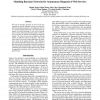Free Online Productivity Tools
i2Speak
i2Symbol
i2OCR
iTex2Img
iWeb2Print
iWeb2Shot
i2Type
iPdf2Split
iPdf2Merge
i2Bopomofo
i2Arabic
i2Style
i2Image
i2PDF
iLatex2Rtf
Sci2ools
FLAIRS
2006
2006
Modeling Bayesian Networks for Autonomous Diagnosis of Web Services
We took an innovative approach to service level management for network enterprise systems by using integrated monitoring, diagnostics, and adaptation services in a service-oriented architecture. The autonomous diagnosis for trouble-shooting of web service interruptions is based on Bayesian network models. In this paper, we present our methods for building the diagnostic models. We focus on two types of Bayesian network models of different structure complexity. Our result shows that the two-layer model outperforms the threelayer model in the applied domain. This challenges the common belief that adding unnecessary nodes in a Bayesian network and growing its structural complexity does not deteriorate performance. Hence such practice of building more complex models than necessary should be approached cautiously within the context of the applied domain.
Applied Domain | Artificial Intelligence | Bayesian Network | Bayesian Network Models | FLAIRS 2006 |
Related Content
| Added | 31 Oct 2010 |
| Updated | 31 Oct 2010 |
| Type | Conference |
| Year | 2006 |
| Where | FLAIRS |
| Authors | Haiqin Wang, Guijun Wang, Alice Chen, Changzhou Wang, Casey K. Fung, Stephen A. Uczekaj, Rodolfo A. Santiago |
Comments (0)

